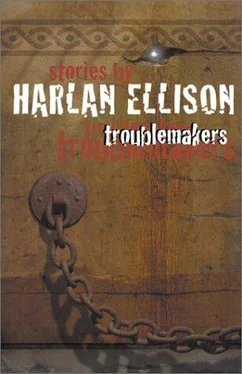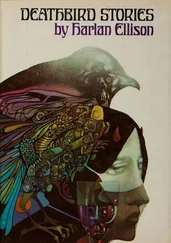Leona Kinzer tried valiantly to compensate. No matter what hour of the day I visited, she always tried to foist food on me. And when Jeffty was in the house she was always at him about eating: “Honey, would you like an orange? A nice orange? Or a tangerine? I have tangerines. I could peel a tangerine for you.” But there was clearly such fear in her, fear of her own child, that the offers of sustenance always had a faintly ominous tone.
Leona Kinzer had been a tall woman, but the years had bent her. She seemed always to be seeking some area of wallpapered wall or storage niche into which she could fade, adopt some chintz or rose-patterned protective coloration and hide forever in plain sight of the child’s big brown eyes, pass her a hundred times a day and never realize she was there, holding her breath, invisible. She always had an apron tied around her waist, and her hands were red from cleaning. As if by maintaining the environment immaculately she could payoff her imagined sin: having given birth to this strange creature.
Neither of them watched television very much. The house was usually dead silent, not even the sibilant whispering of water in the pipes, the creaking of timbers settling, the humming of the refrigerator. Awfully silent, as if time itself had taken a detour around that house.
As for Jeffty, he was inoffensive. He lived in that atmosphere of gentle dread and dulled loathing, and if he understood it, he never remarked in any way. He played, as a child plays, and seemed happy. But he must have sensed, in the way of a five-year-old, just how alien he was in their presence.
Alien. No, that wasn’t right. He was too human, if anything. But out of phase, out of sync with the world around him, and resonating to a different vibration than his parents, God knows. Nor would other children play with him. As they grew past him, they found him at first childish, then uninteresting, then simply frightening as their perceptions of aging became clear and they could see he was not affected by time as they were. Even the little ones, his own age, who might wander into the neighborhood, quickly came to shy away from him like a dog in the street when a car backfires.
Thus, I remained his only friend. A friend of many years. Five years. Twenty-two years. I liked him; more than I can say. And never knew exactly why. But I did, without reserve.
But because we spent time together, I found I was also polite society-spending time with John and Leona Kinzer. Dinner, Saturday afternoons sometimes, an hour or so when I’d bring Jeffty back from a movie. They were grateful: slavishly so. It relieved them of the embarrassing chore of going out with him, of having to pretend before the world that they were loving parents with a perfectly normal, happy, attractive child. And their gratitude extended to hosting me. Hideous, every moment of their depression, hideous.
I felt sorry for the poor devils, but I despised them for their inability to love Jeffty, who was eminently lovable.
I never let on, of course, even during the evenings in their company that were awkward beyond belief.
We would sit there in the darkening living room-always dark or darkening, as if kept in shadow to hold back what the light might reveal to the world outside through the bright eyes of the house-we would sit and silently stare at one another. They never knew what to say to me.
“So how are things down at the plant?” I’d say to John Kinzer.
He would shrug. Neither conversation nor life suited him with any ease or grace. “Fine, just fine,” he would say, finally.
And we would sit in silence again.
“Would you like a nice piece of coffee cake?” Leona would say. “I made it fresh just this morning.” Or deep dish green apple pie. Or milk and tollhouse cookies. Or a brown betty pudding.
“No, no, thank you, Mrs. Kinzer; Jeffty and I grabbed a couple of cheeseburgers on the way home.” And again, silence.
Then, when the stillness and the awkwardness became too much even for them (and who knew how long that total silence reigned when they were alone, with that thing they never talked about any more Flanging between them), Leona Kinzer would say, “I think he’s asleep.”
John Kinzer would say, “I don’t hear the radio playing.
“Just so, it would go on like that, until I could politely find excuse to bolt away on some flimsy pretext. Yes, that was the way it would go on, every time, just the same... except once.
“I don’t know what to do any more,” Leona said. She began crying. “There’s no change, not one day of peace.”
Her husband managed to drag himself out of the old easy chair and went to her. He bent and tried to soothe her, but it was clear from the graceless way in which he touched her graying hair that the ability to be compassionate had been stunned in him. “Shhh, Leona, it’s all right. Shhh.” But she continued crying. Her hands scraped gently at the antimacassars on the arms of the chair.
Then she said, “Sometimes I wish he had been stillborn.”
John looked up into the corners of the room. For the nameless shadows that were always watching him? Was it God he was seeking in those spaces? “You don’t mean that,” he said to her, softly, pathetically, urging her with body tension and trembling in his voice to recant before God took notice of the terrible thought. But she meant it; she meant it very much.
I managed to get away quickly that evening. They didn’t want witnesses to their shame. I was glad to go.
And for a week I stayed away. From them, from Jeffty, from their street, even from that end of town.
I had my own life. The store, accounts, suppliers’ conferences, poker with friends, pretty women I took to well-lit restaurants, my own parents, putting antifreeze in the car, complaining to the laundry about too much starch in the collars and cuffs, working out at the gym, taxes, catching Ian or David (whichever one it was) stealing from the cash register. I had my own life.
But not even that evening could keep me from Jeffty. He called me at the store and asked me to take him to the rodeo. We chummed it up as best a twenty-two-year-old with other interests could... with a five-year-old. I never dwelled on what bound us together; I always thought it was simply the years. That, and affection for a kid who could have been the little brother I never had. (Except I remembered when we had played together, when we had both been the same age; I remembered that period, and Jeffty was still the same.)
And then, one Saturday afternoon, I came to take him to a double feature, and things I should have noticed so many times before, I first began to notice only that afternoon.
I came walking up to the Kinzer house, expecting Jeffty to be sitting on the front porch steps, or in the porch glider, waiting for me. But he was nowhere in sight.
Going inside, into that darkness and silence, in the midst of May sunshine, was unthinkable. I stood on the front walk for a few moments, then cupped my hands around my mouth and yelled, “Jeffty? Hey, Jeffty, come on out, let’s go. We’ll be late.”
His voice came faintly, as if from under the ground.
“Here I am, Donny.”
I could hear him, but I couldn’t see him. It was Jeffty, no question about it: as Donald H. Horton, President and Sole Owner of The Horton TV & Sound Center, no one but Jeffty called me Donny. He had never called me anything else.
(Actually, it isn’t a lie. I am, as far as the public is concerned, Sole Owner of the Center. The partnership with my Aunt Patricia is only to repay the loan she made me, to supplement the money I came into when I was twenty-one, left to me when I was ten by my grandfather. It wasn’t a very big loan, only eighteen thousand, but I asked her to be a silent partner, because of when she had taken care of me as a child.)
Читать дальше












